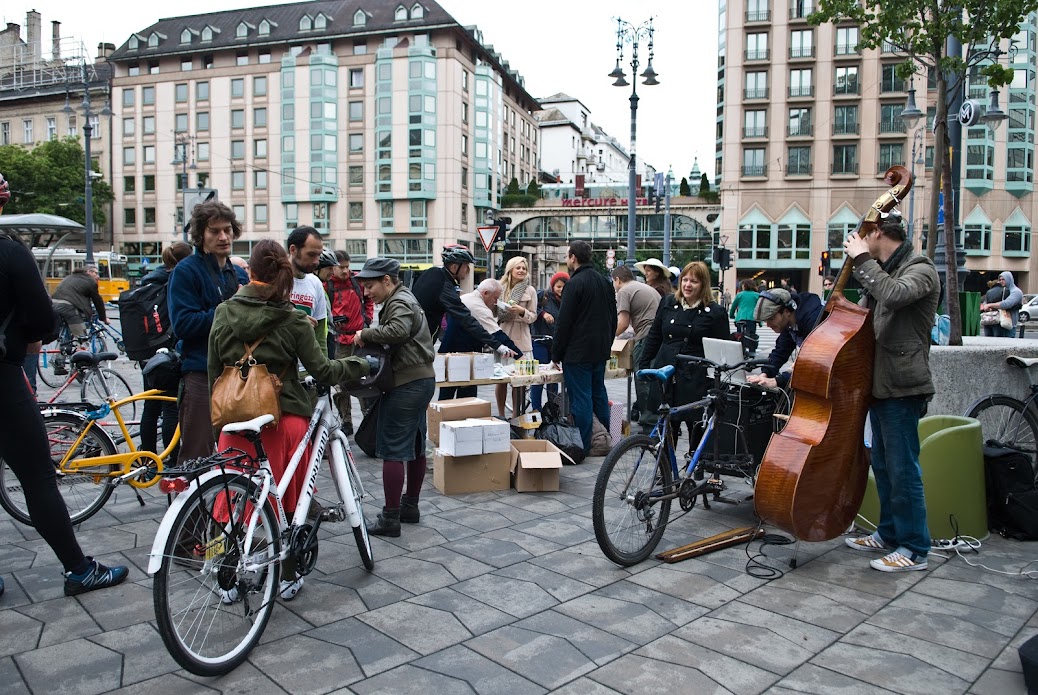Legyél a civil társadalom naprakész tagja!
Értesülj elsőként az aktuális pályázati lehetőségeinkről és a
legfrissebb, civil társadalmat érintő híreinkről!
479 210 person, 3.6 percent of the Hungarian population goes to work on bike. (2011)
In 2014 Hungary was the number four in biking in Europe.

This campaign is based a lot on community feelings. It builds upon workplace relationships, social networks and grassroot cycling movements. In the 2014 spring campaign almost 9000 participants cycled 2 million kms, saving 300 tons of CO2 & 63 million HUF Hungarian forints (210 000 EUR) of fuel and 2200 companies (200 new) joined the campaign.
As the campaign is running for 8 years already, it has to stay interesting. With the help of professional advertising agencies Cycle to Work is organized around a different topic each year. In 2013 it was about „childhood memories” in spring so that a good feeling is evoked. At fall it was about “savings”: how much time and money we can save by cycling. In the spring of 2014 the topic was the “the bag of the biker”, which gave opportunity to organize several interactive games and activities.
Attracting companies and other oganizations to support and join the campaign goes relatively easy. Apart from the Ministry of National Development, which is the owner of the brand, among the sponsors you can find, Mastercard, the Hungarian Post and the Railway as well as McDonalds and several Hungarian companies and media. The support comes usually in form of in-kind donations (eg. gifts for the km collection game, food for biker’s breakfasts) or services (eg. creative campaign, advertisment).
In-kind donations and volunteer work makes a huge part of the campaign and Club’s resources.
It is a great strength but carries some risks as well; keeping deadlines and enforcing commitments is sometimes challanging for the organizers.
The main actions of the campaign are the online kilometer collection game and the biker breakfasts. The previous helps to engage new members, as the old players are organizing work teams thus encouraging collegues to cycle and increase the number of kilometers collected by the group.
During the biker breakfasts cyclists receive food and drinks in the morning rush. At the last occasion it was organized in 38 locations across the country. The club can mobilize hundreds of volunteers and dozens of companies for these events. Biker breakfasts are good photo opportunities and also contact point for the Cyclists’ Club and the Cycle to Work campaign towards the bikers.
Based on a recent survey about the campaign it become clear that only 7% of the responders started to switch to the bicycle because of the campaign. 86% answered that the campaign had no impact on their travel behavior. It has also turned out that only a 1/5th of the responders switched from cars to bike and more than half used public transport before they started to cycle. Even if the campaign doesn’t directly push people to replace their cars with bike, it become an important tool to raise awareness about cycling as a means of everyday transport. It also keeps the idea of cycling in public awareness through the media.
Naturally a basic goal of the Cyclists Club is to raise the number of participants and also to engage companies in a deeper manner (E.g. encouraging them to build bike parking facilities, showers). The most effective way to these goals are decentralized organizing, so the Club seeks to get employers to do more of the organising tasks.
In a more utopistic picture they even see companies paying km fees for cycling workers, similarly to car travel reimbursement. Yet, at the moment, after 8 years of campaign, the Club is happy to being able convincing companies and local governements about the necessity of reducing CO2.
Értesülj elsőként az aktuális pályázati lehetőségeinkről és a
legfrissebb, civil társadalmat érintő híreinkről!